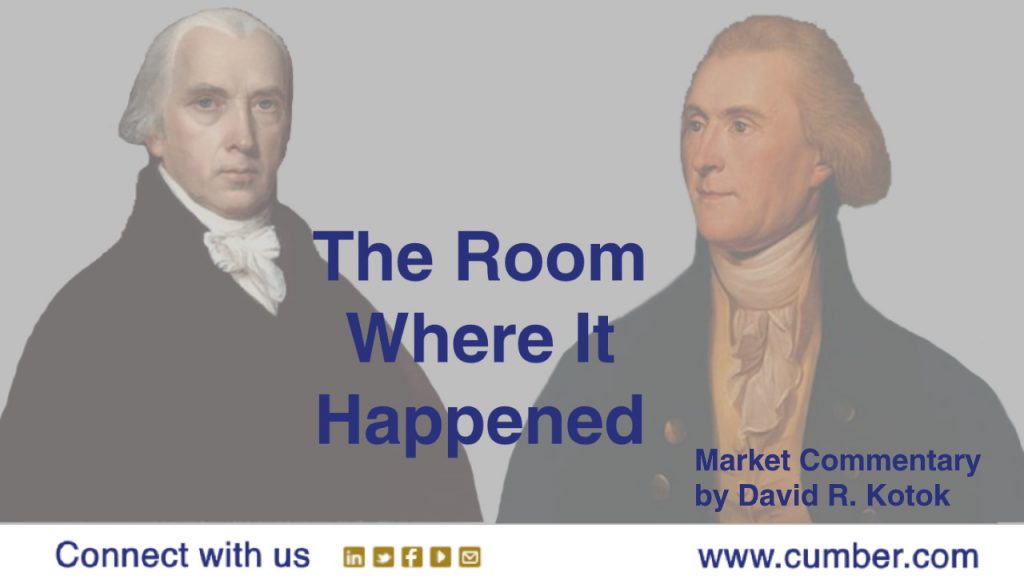“The Room Where It Happened” is a popular theme these days. Not just the book (surprise, surprise!), but also the song. Let’s use this missive to talk about it.
Now that the Disney Channel has made the $1000-per-ticket version of Hamilton available for those with a lesser budget ($6.99), this marvelously imaginative theatre creation belongs on the must-see list. It was a wonderful addition to our 4th of July weekend as a way to escape the raging COVID forest fire burning through Florida.
So here goes. Aaron Burr (Leslie Odom, Jr.) sings “The Room Where It Happened.” Burr is envious because he was not in that room. Hamilton, played by lyricist and composer Lin-Manuel Miranda, and his apparent political rivals Jefferson (Daveed Diggs ) and Madison (Okierete Onoadowan) go into the room. When they come out, a political deal has been struck, and Burr’s ambitions are foiled while Hamilton’s advance.
So what was the deal? This magnificent Broadway show doesn’t embellish on the details.
But that private negotiation between the two Virginians Jefferson and Madison on one side and Hamilton on the other side set the stage for the finances of the United States. The deal in that room survives right through today. Hamilton wanted a central monetary authority. The Virginians were from one of the colonies that managed their debt well after the Revolutionary War. They didn’t want to bail out other states. And they wanted to protect slavery from the political pressures of northern states. Jefferson’s papers suggest he recognized the need to make this deal in order to preserve the union, which was already under pressure.
States not wanting to help other states with their finances – sound familiar? It should, as this is the present dilemma among the states whose unfunded yet promised pension and post-retirement benefits are sinking their creditworthiness while other, more fiscally responsible states don’t want to pick up the tab for others’ poor management. And no compromise in any room has so far been reached to address this dispute. No matter who wins the next election, the issue is likely to persist without any resolution.
But in 1790 the unfunded debt was the result of a war, which the new fusion of the 13 colonies into the United States had to deal with. Hamilton prevailed on the argument for centrality of federal finances when the two representatives of the South agreed to Hamilton’s proposal (which Washington backed) if a separate bill would also be passed. That bill relocated the new nation’s capital from Philadelphia to the place we now call Washington DC. In those years that put the capital between two slave states, Maryland and Virginia. So the deal was made. The two separate pieces of legislation allowed those voting to satisfy their constituents while the Virginians switched votes to make the deal.
The significance of this deal today starts with how Washington DC has developed as the nation’s capital and with how the economics of Maryland and Virginia (both AAA credit states) have benefited by their proximity to the federal center of power. The other issue of massive significance is the centralized issuance of federal debt starting in 1790. Hamilton was a fiscal conservative. So were Jefferson and Madison: Both Virginians were highly critical of the original Hamilton plan, and each subsequently acknowledged its brilliance.
Not one envisioned how much federal debt would be issued and how a central bank would facilitate the marketing of that debt to the world and what the fiscal burden of the federal government would become. Not one of them would have forecast the unfunded liabilities of states like Illinois, New Jersey, Connecticut, Kentucky, and others.
Sooner or later there will have to be another trip to that room. And along with it another version of the “Accord” between the Federal Reserve and the US Treasury (1951). The Accord was needed to complete the Fed’s role in financing the World War 2 debt. All of that is coming after COVID-19 and in the post-COVID stabilization period. All that comes after the outcome of the November election.
Who knows? Maybe, by then, we will get another song?
David R. Kotok
Chairman of the Board & Chief Investment Officer
Email | Bio
Links to other websites or electronic media controlled or offered by Third-Parties (non-affiliates of Cumberland Advisors) are provided only as a reference and courtesy to our users. Cumberland Advisors has no control over such websites, does not recommend or endorse any opinions, ideas, products, information, or content of such sites, and makes no warranties as to the accuracy, completeness, reliability or suitability of their content. Cumberland Advisors hereby disclaims liability for any information, materials, products or services posted or offered at any of the Third-Party websites. The Third-Party may have a privacy and/or security policy different from that of Cumberland Advisors. Therefore, please refer to the specific privacy and security policies of the Third-Party when accessing their websites.
Sign up for our FREE Cumberland Market Commentaries
Cumberland Advisors Market Commentaries offer insights and analysis on upcoming, important economic issues that potentially impact global financial markets. Our team shares their thinking on global economic developments, market news and other factors that often influence investment opportunities and strategies.


